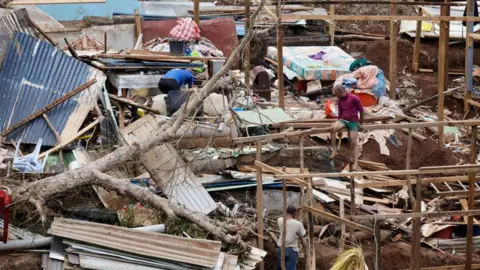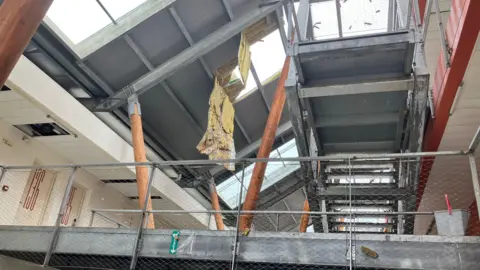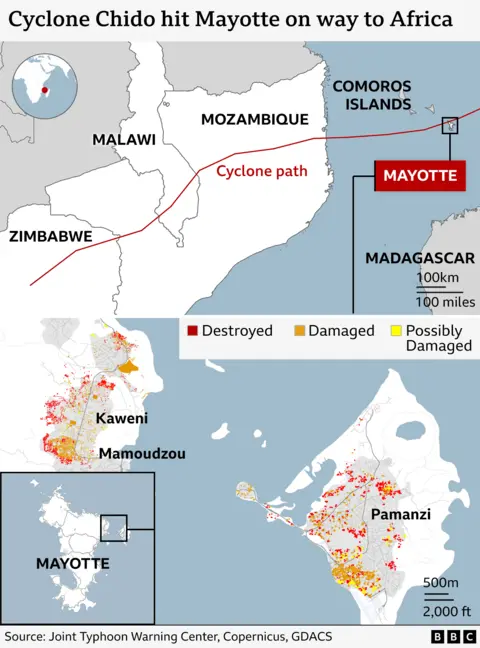
 Getty Images
Getty Images
Mayotte residents survey the damage after Cyclone Chido tore through the French territory, destroying homes made of metal sheets
Landing over Petite-Terre, Mayotte's smaller island, the level of destruction from Cyclone Chido is immediately apparent.
It's hard to exaggerate just how completely devastated the landscape is in this French Indian Ocean territory, which was completely devastated when the storm tore through the islands on Saturday.
Rolling hills previously covered in coconut trees now look barren and black. The leaves of trees have been blown off and their trunks are horizontal.
The airport's signal tower has been mangled by the 220km winds.
Even the nearest airport hotel - a solid structure and one of the few places with working wi-fi and electricity on the island - has a badly damaged roof and broken windows.
At least 31 people are reported by French officials to have died, but thousands are still missing and there are fears the number of dead could rise dramatically.
A state of exceptional natural disaster has been declared for the territory, which is one of the poorest parts of France with many residents living in shanty towns.
Similar scenes of devastation on Mayotte's other main island Grande-Terre greeted French President Emmanuel Macron on Thursday morning as he arrived with four tonnes of food and health aid.

 Getty Images
Getty Images
French President Emmanuel Macron meets with locals in Mayotte
But as he surveyed the damage, some say the level of destruction here is a direct result of his underinvestment in the island.
With his government currently in disarray, and a fierce debate around migration in France, Mayotte finds itself at the centre of a political storm as well as a physical one.
The thousands of illegal migrants on the island have long been a conundrum for the French government, and now some in France are arguing that providing too much help to the territory would encourage more migrants to come.
In the meantime, the residents of France's poorest department are still waiting for food, water and shelter.
As we landed a large downpour came in, filling the buildings whose roofs have been blown off with water.
It's just one example of some of the difficulties that the residents of Mayotte have been living with for almost a week.


Part of the roof at an airport hotel in Mayotte damaged by Cyclone Chido
The state of emergency declared for Mayotte is designed for France's overseas territories to allow administrative barriers to be overcome in order to deal with the crisis more quickly and effectively.
It has been activated for one month, but can be extended by periods of two months if required.
"Faced with this exceptional situation, exceptional resources must be deployed to quickly restore vital services and implement a sustainable reconstruction plan for Mayotte," said the minister responsible for overseas territories, François-Noël Buffet.
Emergency services have been delivering food and water and clearing roads, while also racing to find the missing.
Health workers are concerned infectious diseases could spread, as residents have reported clean drinking water shortages and shops are rationing supplies.
The authorities have said their priority is to get damaged water plants back up and running.
Half the territory remains without power. A newly imposed curfew requires people to stay in their homes for six hours overnight to prevent looting.
Chido - the worst storm to hit the archipelago in 90 years - brought wind speeds of more than 225km/h (140mph) on Saturday, flattening areas where people live in shacks with sheet metal roofs and leaving fields of dirt and debris.
After Mayotte, the storm hit the African mainland, killing at least 45 people in Mozambique and 13 in Malawi.



 3 hours ago
4
3 hours ago
4








